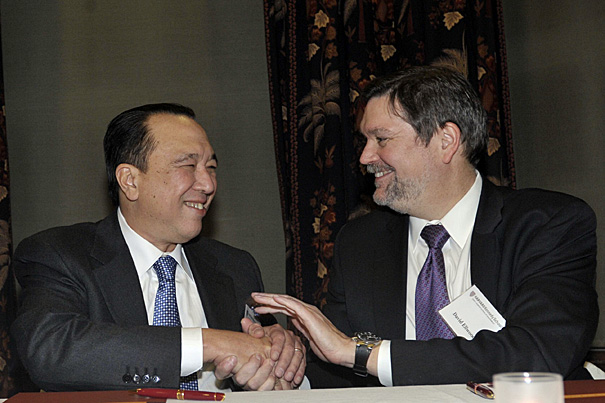
Chairman Peter Sondakh and Harvard Kennedy School Dean David T. Ellwood at the Rajawali Foundation Institute for Asia signing ceremony.
Photo by Tony Rinaldo
HKS receives $20.5M for Asia studies
Rajawali Institute will target key challenges for growing region
Echoing a period of tremendous economic growth and political transformation in East Asia, the Harvard Kennedy School (HKS) has announced a $20.5 million gift to launch an important initiative designed to expand and strengthen the School’s support of policy research and educational programming in Asia.
The permanently endowed Rajawali Foundation Institute for Asia will bring together academics and practitioners from around the world to enhance research, teaching, and training on public policy and governance issues of critical importance in Asia. A separate gift establishes a Harvard Kennedy School Indonesia Program within the institute, which will promote research, education, and capacity building in support of democratic governance and institutional transformation in Southeast Asia. As the world’s largest majority Muslim country, Indonesia is an important model for positive institutional change.
The institute and program will be housed in the newly renamed Ash Center for Democratic Governance and Innovation.
“The Rajawali Foundation Institute for Asia at Harvard Kennedy School will create opportunities for Harvard scholars and students to work with people and institutions throughout the Asian continent,” said Harvard University President Drew Faust. “It will serve as a hub for policy research, education, and dialogue on a region that continues to grow in political and economic influence.”
“We are deeply grateful for this generous gift to the Kennedy School,” said Dean David T. Ellwood. “Asia has experienced dynamic growth and change over the past two decades, enhancing the region’s influence on international policy and discussions while also increasing the challenges facing governments throughout the region. The new institute and program at the Ash Center will help enrich the policy dialogue among scholars, students, policymakers, and Asian leaders throughout many levels of government, business, and civil society.”
“I would like to express my sincere appreciation to Dean Ellwood and Director [Anthony] Saich for making this moment possible,” said Peter Sondakh, chairman of the Rajawali Foundation. “We are embarking on a very important relationship. Establishing the Rajawali Foundation Institute for Asia will open new opportunities both at the Kennedy School and in the region of Asia. For those of us at Rajawali, it is our hope that this institute will be a valuable instrument for deepening understanding of Asia, exploring possibilities for innovation, and advancing important initiatives that will affect millions of lives in Asia.”
The institute will link existing Kennedy School programs focusing on Asia, such as the China Public Policy Program, the Vietnam Program, and Asia Vision 21. Asian scholars and practitioners will spend time at the center as research fellows, attending symposia and participating in executive education and policy dialogue programs. The HKS Indonesia Program will host Indonesian scholars and policymakers who will undertake research fellowships and attend both degree courses and executive education programs. Harvard scholars will collaborate with Indonesian colleagues in Indonesia and will participate in events both in Indonesia and at Harvard.
Anthony Saich, director of the Ash Center for Democratic Governance and Innovation, said, “We are indebted to the Rajawali Foundation for their support in establishing the Rajawali Foundation Institute for Asia and the Harvard Kennedy School Indonesia Program. The newly created institute promises to strengthen our teaching capacity and enhance our center’s public policy research and expertise, not only in Indonesia but throughout Asia, encouraging ongoing dialogue and knowledge sharing among key policymakers, faculty, and students.”
The Ash Center for Democratic Governance and Innovation advances excellence in governance and strengthens democratic institutions worldwide. Through its research, education, international programs, and government innovations awards, the center fosters creative and effective government problem solving and serves as a catalyst for addressing many of the most pressing needs of the world’s citizens.




